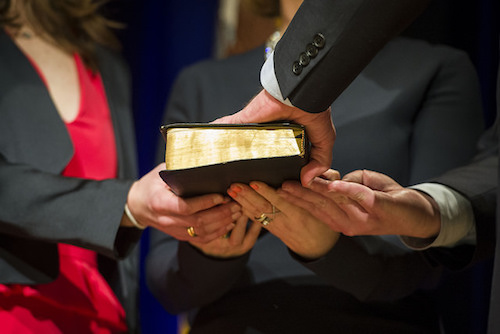We run our website the way we wished the whole internet worked: we provide high quality original content with no ads. We are funded solely by your direct support. Please consider supporting this project.

Jesus Repudiates OT Commands on Oath-Taking: A Response to Paul Copan (#9)
In his critique of Crucifixion of the Warrior God (CWG), Paul Copan argues that “Boyd pushes too hard to make Jesus’ teaching appear more revolutionary than it really is” [italics original]. Whereas I argue that Jesus repudiates aspects of the Old Testament (OT), Copan argues that Jesus merely repudiates wrong applications of the OT, not the OT itself. This is an important point inasmuch as I cite these repudiations as evidence that Jesus placed his own authority above that of the OT as well as evidence that the revelation of God in the crucified Christ radically transforms the meaning that we should find in much of the OT.
Today I will discuss the first teaching of Jesus that I believe repudiates commands in the OT. It concerns Jesus’ prohibition on taking oaths. In his sermon on the mount, Jesus said,
Again, you have heard that it was said to those of ancient times, ‘You shall not swear falsely, but carry out the vows you have made to the Lord.’ But I say to you, Do not swear at all, either by heaven, for it is the throne of God, or by the earth, for it is his footstool, or by Jerusalem, for it is the city of the great King. And do not swear by your head, for you cannot make one hair white or black. Let your word be ‘Yes, Yes’ or ‘No, No’; anything more than this comes from the evil one. (Matthew 5:33-37)
Copan argues that in this teaching “Jesus isn’t disavowing vowing…just casuistic oath-taking that was an escape hatch from truth-telling” [italics original]. In support of this interpretation Copan notes that Jesus was referencing Leviticus 19:12 which says, “And you shall not swear falsely by my name, profaning the name of your God: I am the Lord.”
Copan is correct when he notes that Jesus refers to Leviticus 19:12, and he’s correct that this verse rules out casuistic oaths. But what he seems to miss is that Jesus cites this passage only to contrast his teaching with it. Let’s look at it again. “You have heard that it was said to those of ancient times, ‘You shall not swear falsely, but carry out the vows you have made to the Lord”(Matt 5:33). They had indeed heard this said, for its right there in Leviticus 19:12. But then Jesus goes on to contrast his teaching with this OT passage when he adds: ”But I say to you, Do not swear at all…”
According to Jesus, are we not only supposed to avoid swearing falsely, as when people make casuistic oaths to avoid telling the truth. We are to avoid swearing at all, for anything more than a simple “Yes” and “No,” Jesus says, comes from the evil one” (Matt 5:37). Apparently, any kind of oath-taking, such as those that Leviticus 19:12 (and, we could add, Deuteronomy 23:21) allows, is from the devil.
Not only does Jesus’ teaching repudiate OT passages that allow oath-taking, it repudiates Deuteronomy 6:13 which commands it. “The Lord your God you shall fear; him you shall serve, and by his name alone you shall swear.” The children of Israel at this time were supposed to make oaths by the name of the Lord. Jesus’ teaching to “not swear at all” and to let our “Yes” be “Yes” and our “No” “No,” revokes the portrait of God giving this command and even associates it with a demonic influence.
So, I stand by my claim that aspects of Jesus’ teaching radically contrast with what we find in the OT. And this is why I contend that for all of us who know God as he’s revealed in Jesus’ cross-centered ministry, OT passages such as the ones we’ve just discussed should be understood to bear witness to how far God has always been willing to stoop to bear the sin of his people and to thereby take on an appearance that mirrors that sin, just as he does for the world on Calvary.
Photo by Secretary of Defense on VisualHunt.com
Category: General
Tags: Cruciform Theology, Jesus, New Testament, Old Testament
Topics: Biblical Interpretation
Related Reading

Overemphasizing Christ?
In response to my work, some have argued that I tend to overemphasize Christ. In light of the claim that in Jesus we have the one and only definitive Word of God and that no previous revelation should ever be placed alongside him or allowed to qualify what he reveals about God, some allege that…

Is there Archeological Support for the Reliability of the Gospels?
One of the many tests historians typically submit documents to in accessing their historical reliability concerns the extent to which archeology supports or undermines the historic claims the document makes. So we need to investigate the extent to which archeology confirms, or refutes, aspects of the Gospels. Before we address this question, however, a preliminary…

The Politics of Jesus
Many are so conditioned by the mindset of the world that they can’t even envision an alternative way of affecting society and politics other than by playing the political game as it is done by the established governmental system. Some thus conclude that, since Jesus didn’t try to overhaul the political systems of his day…

Old Testament Support for the Warfare Worldview
Rebuking Hostile Waters Satan plays a minor role in the Old Testament relative to the New Testament. Instead, the warfare worldview in the Old Testament is expressed in terms of God’s conflict with hostile waters, cosmic monsters, and other gods.Like their Ancient Near Eastern neighbors, ancient Jews believed that the earth was founded upon and…

Christmas is Subversive…
…at least the first Christmas was. When Jesus came it was about the birth of a subversive ruler who brought a subversive kingdom. He is a king that came to introduce a reign that would overthrow the world. Click here for a brief reflection by Greg on Subversive Christmas, brought to you by Nomad.

How NOT To Be Christ-Centered: A Review of God With Us – Part I
Theologians throughout Church history have used the concept of divine accommodation to account for everything in Scripture that seemed “unworthy” of God. Whatever didn’t line up with what we know about God was seen as God accommodating his revelation to our limited and fallen framework. The trouble is, theologians have, by and large, used the…
